

Solutions for Stress, Controlling Emotional Stress, Stress Conditions, HeartMath Tools. デブリーフィング【debriefing】の意味 - 国語辞書. シックスセカンズのEQ国際公認資格セミナーの開催風景. 6seconds-certification.pdf. Why Great Leaders Get Angry. Inc. / USA Think about remarkably successful entrepreneurs.
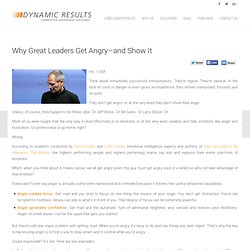
They’re logical. They’re rational. In the face of crisis or danger or even gross incompetence, they remain steely-eyed, focused, and on point. They don’t get angry–or at the very least they don’t show their anger. Unless, of course, they happen to be Steve Jobs. Most of us were taught that the only way to lead effectively is to eliminate, or at the very least swallow and hide, emotions like anger and frustration. Wrong. Emotional Intelligence Courseware - Soft Skills Training Materials. Test Your Awareness: Do The Test. 自尊心. 自尊心(じそんしん self-esteem)とは、心理学的には自己に対して一般化された肯定的な態度である[1]。

一般には自惚れなどとも同一視されるが、ここでは社会心理学における自己の概念に関連して高揚もしくは維持されようとする態度、あるいは精神医学(QOL)上の『ありのままの自己を尊重し受け入れる』態度とする。 概要[編集] 社会における人間のさまざまな行動は時に構造的な原因ではなく個人的な原因によって左右される場合がある。 ここで問題となるのはそのような個人の行動を決定している自己(self)の状態である。 Emotional Intelligence Audiobook. Is IQ destiny?
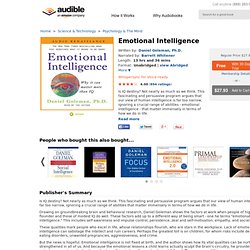
Not nearly as much as we think. This fascinating and persuasive program argues that our view of human intelligence is far too narrow, ignoring a crucial range of abilities that matter immensely in terms of how we do in life. Drawing on groundbreaking brain and behavioral research, Daniel Goleman shows the factors at work when people of high IQ flounder and those of modest IQ do well. The Six Seconds Model of Emotional Intelligence: EQ in ActionSix Seconds. Masters_in_High_Performance_Leadership_brochure_version_3_Agust_2012.pdf. 日本心理学会. Emotional Intelligence Certification - Virtual Program. The NexusEQ Conference, June 24-26, 2013. Emotional Competence Training – American Express Financial Advisors - Emotional Intelligence Consortium Model Program.
Program Summary The Emotional Competence training program for managers has been under development at American Express Financial Advisors since 1992.
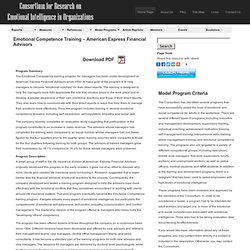
A major goal of the program is to help managers to become "emotional coaches" for their direct reports. The training is designed to help the managers more fully appreciate the role that emotion plays in the work place and to develop a greater awareness of their own emotional reactions and those of their direct reports. They also learn how to communicate with their direct reports in ways that help them to manage their emotions more effectively. Thus, the program includes training in several emotional competency domains, including self-awareness, self-regulation, empathy, and social skill. The company recently completed an evaluation study suggesting that participation in the program contributes to an increase in sales revenue. The program has been offered dozens of times throughout the company on a continuous basis since 1994. Emotional Intelligence Consoritum - Articles, Research and Information on Emotional Intelligence.
EQ Train-the-Trainer Certification Level I. The NexusEQ Conference, June 24-26, 2013. NexusEQ. Presentation at Harvard - How To Increase Emotional Intelligence through Body Language. Presentation at Harvard - How To Increase Emotional Intelligence through Body Language. Power Posing How the Body Changes the Mind - Amy J.C. Cuddy. Amy Cuddy: Your body language shapes who you are. Wyatt Woodsmall Emotional Intelligence 01 of 02 watch, Wyatt Woodsmall Emotional Intelligence 01 of 02 listen, EQ Train-the-Trainer Certification Level I.
About Emotional Intelligence. Resources.
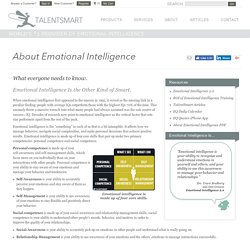
Wyatt Woodsmall Emotional Intelligence 01 of 02. Fuel Critical Thinking: Ask Powerful QuestionsSix Seconds. What will best fuel your learning and thinking: Data or questions?
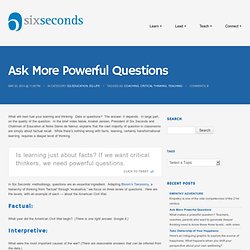
The answer: It depends. In large part, on the quality of the question. In the brief video below, Anabel Jensen, President of Six Seconds and Chairman of Education at Notre Dame de Namur, explains that the vast majority of question in classrooms are simply about factual recall. While there’s nothing wrong with facts, learning, certainly transformational learning, requires a deeper level of thinking. In Six Seconds’ methodology, questions are an essential ingredient. Emotional Intelligence 101: Why and How To Put EQ Into ActionSix Seconds. Let’s break it down: What is emotional intelligence and why does it matter?
How does this make a difference in my life at work, school, home? Next week is our 3rd annual free online conference, EQ Week. Nano Tools for Leaders® For Better Results, Emotional Contagion Matters By Sigal Barsade, Joseph Frank Bernstein Professor of Management, The Wharton School Nano Tools for Leaders® are fast, effective leadership tools that you can learn and start using in less than 15 minutes — with the potential to significantly impact your success as a leader and the engagement and productivity of the people you lead.

The Goal: Create an environment that enhances employee engagement and performance by paying attention to the emotional contagion occurring in your team. How Your Beliefs Create Your Reality part 2 - Advanced Life Skills. Understanding that the mind is only creative can help us grasp the power of beliefs.
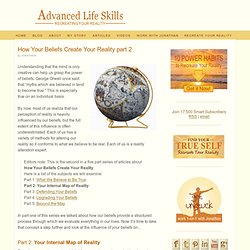
George Orwell once said that “myths which are believed in tend to become true.” This is especially true on an individual basis. By now, most of us realize that our perception of reality is heavily influenced by our beliefs, but the full extent of this influence is often underestimated. Each of us has a variety of methods for altering our reality so it conforms to what we believe to be real. Each of us is a reality alteration expert. State of the Heart: EQ in the World Today (EQ Week) Tickets. Invalid quantity.
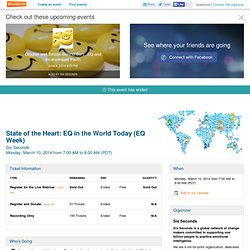
Please enter a quantity of 1 or more. The quantity you chose exceeds the quantity available. Please enter your name. Please enter an email address. Please enter a valid email address. Please enter your message or comments. Please enter the code as shown on the image. Please select the date you would like to attend. Please enter a valid email address in the To: field. Please enter a subject for your message. Emotional Intelligence. EQ-Certification.pdf. What is Self-Science? Emotional Intelligence in the Classroom -Six Seconds. I heard the term “self-science” for the first time approximately 34 years ago.
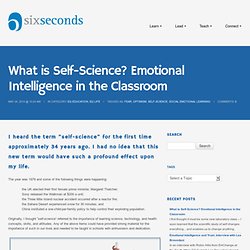
I had no idea that this new term would have such a profound effect upon my life. The year was 1979 and some of the following things were happening: the UK elected their first female prime minister, Margaret Thatcher;Sony released the Walkman at $200 a unit;the Three Mile Island nuclear accident occurred after a reactor fire;the Sahara Desert experienced snow for 30 minutes; andChina instituted a one-child-per-family policy to help control their exploding population. Originally, I thought “self-science” referred to the importance of learning science, technology, and health concepts, skills, and attitudes. Any of the above items could have provided strong material for the importance of such in our lives and needed to be taught in schools with enthusiasm and dedication.
Karen then asked the students to suggest some other things of which someone might be afraid. The Six Seconds Model of Emotional Intelligence: EQ in ActionSix Seconds. Get Started with Emotional Intelligence -Six Seconds. Want to learn more about emotions and emotional intelligence? At Six Seconds, we believe emotions are valuable signals that help us survive and thrive. When we learn how to use them, emotions help us make more effective decisions, connect with others, find and follow purpose — and lead a more whole-hearted life. In simple terms, “emotional intelligence” just means being smarter with feelings.
It’s about putting together the rational and emotional so you can move forward effectively. Emotions are part of human biology, they are chemicals that help regulate our minds and bodies, assisting us to cope with complexities of making decisions, interacting with people, and finding our way through life. Education -Six Seconds. Six Seconds helps create optimal learning environments where young people develop key skills for academic and lifelong success. The Center for Social Emotional Learning identifies and shares research-based best practices to create great places to learn. We conduct research, deliver certification training, and raise awareness of the power of emotional intelligence to improve the lives of students and educators.
The research is abundantly clear: Social and emotional factors are the drivers or limiters of learning. When children (and the adults who support them) are engaged, curious, safe, and thriving, then they achieve. EQ-Certification.pdf.